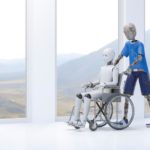 In the earlier days of robotics in healthcare, an interesting study explored how older people felt about having robots in their care facilities. The research found that senior citizens are quite happy to accept robots as helpers, but are much more concerned about ceding too much control to them.
In the earlier days of robotics in healthcare, an interesting study explored how older people felt about having robots in their care facilities. The research found that senior citizens are quite happy to accept robots as helpers, but are much more concerned about ceding too much control to them.
Key to this relationship was the mental model that the senior citizens had formed about robots. In other words, if they went into the relationship thinking positively, or negatively, about robots, then that had a big impact on how the relationship went.
Have things changed in the intervening years? New research from Friedrich Schiller University, in Germany, suggests not a great deal. They also found that older patients aren’t unduly concerned by robots in their care facility, but they do have a number of important conditions.
Achieving acceptance
The researchers conducted a number of experiments, primarily whereby videos were shown to participants, half of whom were around 70 years of age, and another half around 20. They were asked to evaluate the friendliness of the robots shown to them in the videos, and whether they could imagine them being a daily companion.
“In the tests, the older participants made a clearly positive assessment of the machines – and were even more open-minded towards them than the younger comparison group,” the researchers explain. “In the older participants, we were unable to confirm a scepticism towards robots that is frequently assumed in science.”
The decisive factor in the results appears to be the likeness of the machines to humans. If the machines had a facial expressions, arms and legs, and a general human-like appearance, this increased the likelihood of acceptance.
The study suggests a similar approach could also work for people with autism, especially in a therapeutic context.
“People with autism often have handicaps in the area of social communication; for example, they cannot interpret facial expressions correctly. It is important for them that their environment is predictable,” the researchers say. “With its automated communication – more predictable when compared with a human partner – a robot could help with this.”
The latest study was arguably too small to draw firm conclusions on its own, but given that it shares similar outcomes to previous work, it would appear as though using robots in care environments could be welcomed by older people, providing it’s done in the right way.